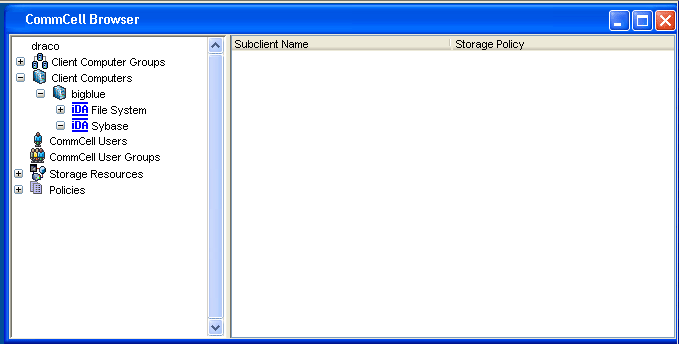
bigblue: Client
Sybase: Agent
<user_defined_instance>: Instance
![]()
Choose from the following topics:
Sybase software comprises several system databases and user databases that are backed up and restored by the Sybase iDataAgent. From the perspective of the Sybase iDataAgent, each of these database types is backed up and restored in the same manner. Sybase system databases contain information that Sybase needs to operate (e.g., user database characteristics, file locations). For more information on the types of data in system databases, refer to your Sybase documentation from Sybase Corporation. Sybase user databases contain your enterprise’s data, related administration files and transaction logs.
Data Protection Operations for the following data types are supported by the Sybase iDataAgent:
Data Protection Operations for all other data types not mentioned in the above list are not supported by the Sybase iDataAgent.
Both of these data types can be secured by the appropriate File System iDataAgent.
When the Sybase iDataAgent is installed, the following levels are automatically created in the CommCell Browser.
 |
|
bigblue: Client Sybase: Agent <user_defined_instance>: Instance |
|
|
|
In order to run the first backup, instances must be added. Each instance creates a default subclient. |
To perform a data protection operation using this Agent a specific Product License must be available in the CommServe® Server.
Review general license requirements included in License Administration. Also, View All Licenses provides step-by-step instructions on how to view the license information.
The following definitions are offered to clarify the term 'client':
For the Sybase iDataAgent, each instance can represent one or multiple databases. A Sybase iDataAgent can support multiple instances, and each instance can support multiple subclients.
Sybase instances must be created manually. However, for each instance that you create, a default subclient is automatically created. Initially, each default subclient contains all of the databases for the instance. Thereafter, you can create one or more user-defined subclients to suit your backup needs.
Instances have various configuration options, and these options affect the associated subclients. These and other options are accessed using the Instance Properties dialog box.
In addition to the Sybase database, there may be Sybase application files stored on the computer (that is, the client, as defined above). Such data is not backed up by the Sybase iDataAgent. To secure such data from a Sybase client, you must back it up using the appropriate iDataAgent for the computer’s file system.
A transaction log is a file containing a record of changes to a database. Each database has its own transaction log.
Truncation of transaction logs follows these rules for the Sybase iDataAgent: